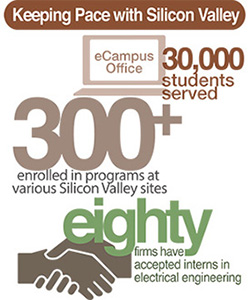For a traditional university, the ability to combine the expertise of its faculty with that of the leading engineers and researchers in local industries is a remarkable accomplishment. San Jose has used its self-support capacity not only to create and deliver collaborative programs off-campus but also to support their continuous evolution and the faculty’s ongoing engagement with curriculum change. In responding to regional needs, San Jose enables its faculty to work on the frontline of innovation outside the university and thus to bring knowledge and links to industry back into the campus in fields such as engineering, computer science, biology, and chemistry. Using a similar strategy, the campus has developed specialized training programs and seminars for engineers who already hold master’s degrees. Further, collaboration with regional industries that do commerce worldwide has opened doors for San Jose itself to expand its international links, to the advantage of both students and faculty.
The Achievements: By linking the campus creatively to its region, San Jose has built a strong reputation in the sciences, engineering, and computer science. This, in turn, enables San Jose to attract first-rate faculty and to offer on-campus students an exceptional educational experience. Also, by using self-support to forge meaningful relationships in the region, San Jose can offer internships to students at 80 regional firms in electrical engineering alone. Many of the faculty supervising such interns are themselves involved in research with the respective firms. This linking strategy has not only expanded San Jose’s grants and research contracts but has encouraged local industry to provide funding for more effective use of current technologies in the campus’s labs and classrooms.
San Jose currently offers self-support, off-campus master’s degrees in various engineering fields with Lockheed Martin, IBM, KLA Tencor, and LAM Research Corporation. International connections engendered by this strategy include a new student exchange relationship, supported by San Jose’s self-support unit, with Dublin City University (a high-tech research institution) and a Silicon Valley firm, Cypress Semiconductor. This program offers international students an engineering education in Silicon Valley and has opened new internships at Cypress Semiconductor. Similarly, JMK University from Jyvaskala, Finland, and EFREI, a technical school in Paris, send students to San Jose for a Silicon Valley experience. These international students bring diversity and intellectual stimulation, enriching the educational experience for all and expanding the opportunities for San Jose students to study abroad in relevant fields.
The Model Extended: The regions surrounding many CSU campuses house firms and industries that are themselves hubs of research in a particular field or are at the forefront of professional practice, having national and even global connections. CSU campuses that wish both to serve their region and to expand their own capacities in teaching, learning, and research might well adopt the San Jose strategy. Indeed, higher education overall needs to embrace educational modes that are increasingly found outside of colleges and universities. The CSU self-support capacities, used as part of a comprehensive strategic vision, offer a powerful tool for lowering walls and opening doors.








